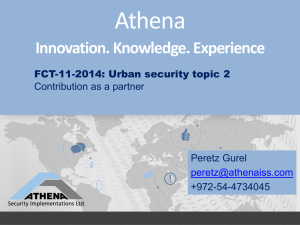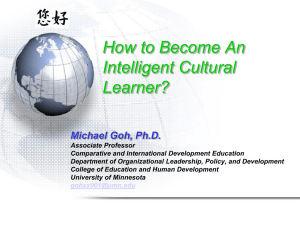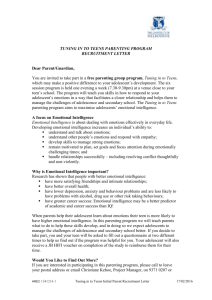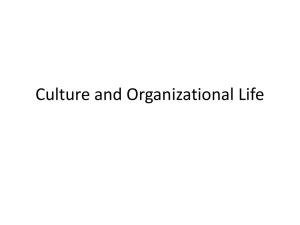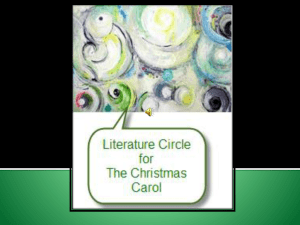True Education Success PPT
advertisement
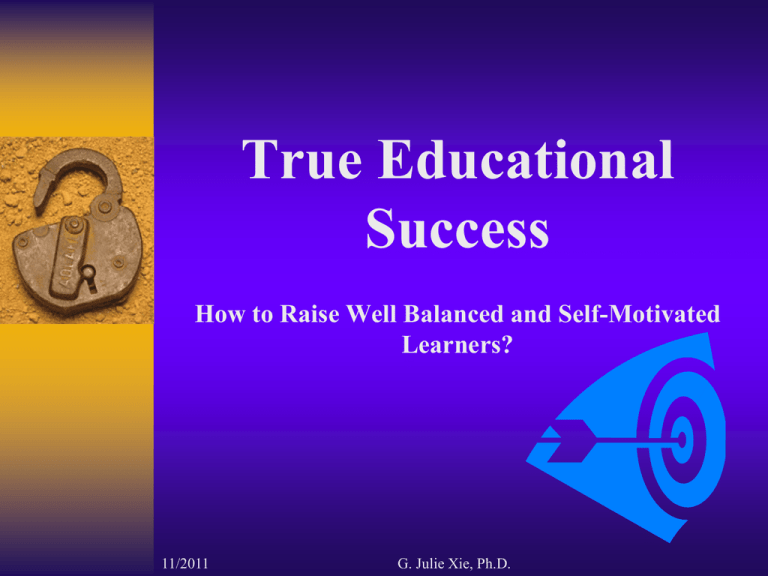
True Educational Success How to Raise Well Balanced and Self-Motivated Learners? 11/2011 G. Julie Xie, Ph.D. Agenda What is success? Adverse effects of narrow perception of success Factors behind success in education How can parents and school help children achieve true success in education? 11/15/2011 What is SUCCESS? - sample students’ opinions Accomplish your goals Be happy or satisfied with yourself Get a job with strong earning potential Earn good grades, B or better Try your best and reach your potential Doing things you want to do Go to a prestigious college Make my parents proud Excel in a certain field 11/15/2011 34% 21% 18% 13% 12% 8% 4% 3% 1% What is SUCCESS? - students’ perception of their parents’ belief Earn good grades, A’s preferred Get a job with strong earning potential Be happy or satisfied with yourself Go to a prestigious college Accomplish your goals Try your best and reach your potential Do not know parents’ thoughts Doing things you want to do Excel in a certain field 11/15/2011 26% 20% 13% 10% 10% 10% 7% 3% 1% How Narrow Definitions of Success Adversely Affect Our Children? 5- to 12-year-olds need 10-11 hours of sleep each night; teens need 9.25 hours of sleep each night. 80% of teens don’t get the recommended amount of sleep. At least 28% fall asleep in school, and 22% fall asleep doing homework. Source: National Sleep Foundation. (2006). 11/15/2011 www.challengesuccess.org 50% of Bay Area teens report headaches, difficulty sleeping, and exhaustion due to stress over the past month. Source: Galloway, M. K., Conner, J. O., & Pope, D. (2009). Stanford Survey of Adolescent School Experiences. 11/15/2011 62% of Bay Area high school students surveyed said they always or almost always work hard in school, but only 10% always or almost always enjoy schoolwork. Source: Galloway, M. K., Conner, J. O., & Pope, D. (2009). Stanford Survey of Adolescent School Experiences. 11/15/2011 59% of teenagers say they have cheated on a test during the last year, and 34% have done it more than twice, while one in three admit having used the internet to plagiarize an assignment. Source: Josephson Institute Center for Youth Ethics. (2010). Josephson Institute of Ethics’ report card on American youth’s values and actions. 11/15/2011 The greater the amount of time adolescents report spending in regularly scheduled structured activities, the higher their selfreported level of anxiety tends to be. Source: Melman, S., Little, S. G., & Akin-Little, K. A. (2007). Adolescent over scheduling: The relationship between levels of participation in scheduled activities and self-reported clinical symptomology. The High School Journal, 90 (3), 18-30. 11/15/2011 54% of high school females and 32% of high school males (out of a sample of nearly 5000 Bay Area youth) reported 3 or more symptoms of physical stress in the past month. Source: Galloway, Mollie K., Conner, Jerusha O., and Pope, D. (2009). Stanford Survey of Adolescent School Experiences. 11/15/2011 9% of Bay Area high school students surveyed reported use of illegal prescription drugs to stay awake; an additional 25% use legal stimulants. Source: Galloway, M. K., Conner, J. O., and Pope, D. (2009). Stanford Survey of Adolescent School Experiences. 11/15/2011 In 2010, 24 percent of 12th-grade students (28 percent of males and 20 percent of females), 19 percent of 10thgrade students (22 percent of males and 15 percent of females), and ten percent of 8th-grade students (10 percent of males and 9 percent of females) reported illicit drug use in the previous 30 days. For 8th graders, this was up from 8 percent in 2009. Source: Johnston, L.D., O’Malley, P.M., Bachman, J.G., & Schulenberg, J.E. (forthcoming, 2011). Monitoring the Future national survey results on drug use, 1975–2010: Volume I, Secondary school students. Ann Arbor: Institute for Social Research, The University of Michigan. 11/15/2011 73% of students listed academic stress as their number one reason for using drugs, yet only 7 % of parents believe teens might use drugs to deal with stress. Source: Partnership for a Drug-Free America, (2008). Partnership attitude tracking study, 2007. 11/15/2011 Factors behind Success in Education: -- from our administrators good study skills so students know how to access the information they want and know how to get the help when they need. confidence that they can accomplish anything if they are willing to work hard enough development of critical thinking skills development of good social and communication skills 11/15/2011 How to Raise Well-Balanced, SelfMotivated Learners? How to Help Our Children Succeed? 11/15/2011 Self-Actualization Esteem Belonging and Love Safety Physiological Needs Maslow’s Hierarchy of Needs (1954) 11/15/2011 Understand Your Child: Temperament Quality of Mood Approach or Withdrawal Intensity of Reaction Rhythmicity (regularity) Distractibility Persistence Threshold of Responsiveness Activity Level Adaptability Thomas & Chess (1977) 11/15/2011 Understand Your Child: Ability • Linguistic intelligence • Logical-mathematical intelligence • Musical intelligence • Bodily-kinesthetic intelligence • Spatial intelligence • Interpersonal intelligence • Intrapersonal intelligence • Naturalist intelligence Frames of Mind: The Theory of Multiple Intelligences. Howard Gardner, Ph.D. (1983) 11/15/2011 Emotional Intelligence: Why it can matter more than IQ? Self-Awareness: understand yourself Self-Control: managing emotions Self-Efficacy: Optimism & Hope, especially in face of challenges or defeats Empathy: understand others Social Skills (Daniel 11/15/2011 Goleman, 1995) Self-discipline is a far better predictor of academic performance than is IQ, accounting for more than twice as much variance as IQ in final grades. Source: Duckworth, A.L., & Seligman, M.E.P. (2005). Self-discipline outdoes IQ in predicting academic performance of adolescents. Psychological Science,16(12), 939-944. 11/15/2011 Authentic Happiness Happiness = Set Range + Circumstances + Voluntary Factors - Increase gratitude - Understand how belief controls affect - Satisfaction about the past + Optimism about the future ( Martin E. P. Seligman, 2002) 11/15/2011 How can parents help? Define success on your own terms Avoid over-scheduling Maintain down time and family time Allow children space to develop on their own Honor health and well being Build responsibility at home and in the community Ease performance pressure Debunk college myths www.challengesuccess.org 11/15/2011 How can parents help? Understand and respect your child as an individual Allow choices to build motivation Positive Reinforcement: Praise efforts Positive discipline to foster healthy selfconcept Model positive attitudes and emotions in daily life – take mistakes as opportunities to learn and grow from 11/15/2011 The permissive parent attempts to behave in a nonpunitive, acceptant and affirmative manner towards the child's impulses, desires, and actions. The authoritarian parent attempts to shape, control, and evaluate the behavior and attitudes of the child in accordance with a set standard of conduct, usually an absolute standard, theologically motivated and formulated by a higher authority. The authoritative parent attempts to direct the child's activities but in a rational, issue-oriented manner. The parent encourages verbal give and take, shares with the child the reasoning behind her policy, and solicits his objections when children refuse to conform. (Diana Baumrind, 1967) 11/15/2011 How can our school help? Climate of care Project and problem based learning Meaningful assignments Authentic assessment Honor engagement and integrity in learning (www.challengesuccess.org) 11/15/2011 Students in social and emotional learning (SEL) programs in schools not only demonstrate increased social and emotional skills and attitudes but also demonstrate improved academic performance, reflected in an 11-percentile-point gain in achievement. Source: Durlak, J. A., Weissberg, R. P., Dymnicki, A. B. Taylor, R. D., and Schellinger, K. B. (2011). The impact of enhancing student’s social and emotional learning: A meta-analysis of school-based universal interventions. Child Development, 82(1), 405-432. 11/15/2011 Middle school students’ perceptions ------ significant predictors of academic and psychological adjustment Perceptions of an emphasis on competition and differential treatment by ability are related to diminished academic values, feelings of selfesteem, and academic achievement as well as increases in school truancy, anger, and depressive symptoms Perceptions of positive teacher regard and an emphasis on individual effort and improvement in school are associated with increases in academic values, feelings of academic competence, and academic achievement as well as decreases in depressive symptoms, anger, and school truancy and increases in self-esteem over time. Source: Roesler, R. W., & Eccles, J. S. (1998). Adolescents' perceptions of middle school. Journal of Research on Adolescence, 8(1), 123–158. 11/15/2011 The Ultimate Goal of Education "The only person who is educated is the one who has learned how to learn and change." - Carl Rogers (1902-1987) Education is what remains after one has forgotten everything he learned in school. - Albert Einstein (1879-1955) 11/15/2011 Excerpted from the book CHILDREN LEARN WHAT THEY LIVE ©1998 by Dorothy Law Nolte and Rachel Harris If children live with criticism, they learn to condemn If children live with shame, they learn to feel guilty If children live with encouragement, they learn confidence If children live with tolerance, they learn patience If children live with praise, they learn appreciation If children live with acceptance, they learn to love If children live with kindness and consideration, they learn respect If children live with security, they learn to have faith in themselves 11/15/2011 References Gladwell, M. (2008). Outliers: The Story of Success. Little, Brown and Company: New York. Goleman, D. (1995). Emotional Intelligence: Why It Can Matter More Than IQ. Bantam Books: NY. Nelsen, J. Positive Discipline Associates. http://www.positivediscipline.com Seligman, M. E. P. (2002). Authentic Happiness: Using the New Positive Psychology to Realize Your Potential for Lasting Fulfillment. Free Press: NY. Stanford University School of Education: Challenge Success: www.challengesuccess.org Mission San Jose HS SOS: www.missionsos.net 11/15/2011



